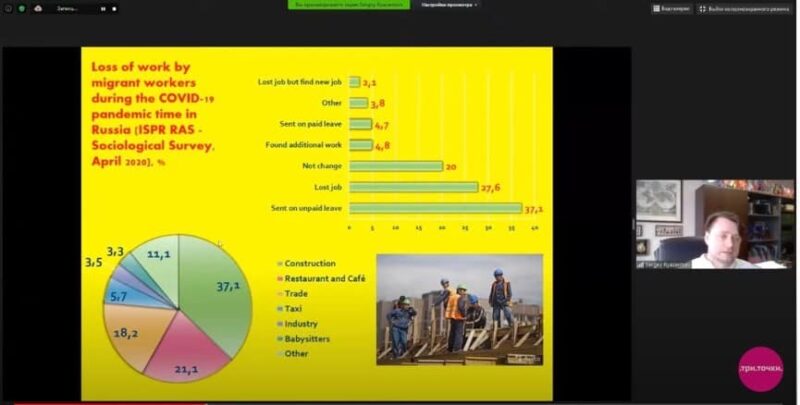On July 7, 2020, Internews hosted a regional conference “Migration in the time of COVID-19. What a journalist should know.” The event was hosted in partnership with International Organisation for Migration’s (IOM) regional project “Strengthening the fight against human trafficking and protecting vulnerable migrants in Central Asia in response to regional and global challenges” funded by the Ministry of Foreign Affairs of the Kingdom of Norway.
Over 70 journalists, media specialists and experts from Kazakhstan, Kyrgyzstan, Tajikistan, Uzbekistan, and Turkmenistan attended this online conference. Participants shared which problems migrants and refugees face in Central Asia, how the pandemic affected the situation with migration in the region, what international and non-profit organisations are doing to help migrants. Participants showcased examples of journalistic projects on migration in the time of COVID-19, which were done in other regions in cooperation with IOM, Internews, and other non-profit organisations.
“This conference is part of our large educational programme, which was launched with the support of the European Union (EU). Within this programme, we will be carrying out an online campaign over the course of the year. The programme is designed to help our colleagues and journalists effectively tell and cover the stories of importance for our region, aimed at migrants, refugees, and national minorities,” said Farhod Rakhmatov, Internews’ Project Director.
Yevgeny Hon, IOM’s National Programme Coordinator told how the situation with migration in Central Asia and Russia escalated during the pandemic. Nodira Saidkarimova, the country coordinator of the USAID project on safe migration in Central Asia, spoke about the challenges that migrants in Central Asia faced during COVID-19. The expert also gave some tips on sensitive coverage of migration during the pandemic.
The conference participants were the first ones to publicly see the interim findings of a study on how the pandemic affected migration trends and remittances to Central Asia, as presented by Russian experts Sergey Ryazantsev and Marina Khramova. Civil society representatives from Russia and Kazakhstan spoke about the work that CSOs do to protect the rights of migrants during lockdown and shared personal stories of some of the migrants.
During the conference, the organisers announced a call for sub-grants of maximum € 20,000 each to support the most practical ideas developed by journalists, content producers and civic activists aimed at vulnerable groups during the COVID-19 period.
The conference was part of the educational programme for media on covering the situation with migration, refugees, and national minorities during the pandemic. The programme aims to contribute to media sustainability and to increase awareness on migration and vulnerable groups in the time of COVID-19.
The online training was organised within the project “Strengthening Resilience to Radicalisation and Disinformation in Central Asia” funded by the European Union and implemented by Internews.
For more information, please contact Farhod Rakhmatov, Project Director, +996 (312) 98-68-80 ext. 305
Full recording of the conference
About the project
“Strengthening Resistance to Radicalisation and Disinformation in Central Asia” is implemented by Internews, international non-profit organisation, and funded by the European Union. The project aims to strengthen citizens’ resilience to radicalisation and misinformation leading to violent extremism by supporting the media, civil society organisations, government agencies, religious leaders, and activists from Kazakhstan, Kyrgyzstan, Tajikistan, Turkmenistan, and Uzbekistan. To achieve this, Internews will support national and regional projects on production of inclusive, high-quality content that is accurate, trustworthy, and balanced to help local people increase their ability to make informed choices and take positive measures in support of peace and security against radicalisation. The project has been implemented since October 2019 with a total budget of 4,500,000 EUR and covers all countries of Central Asia.
(Banner photo: Presentation of findings of interviews conducted among migrants by Russian experts: Sergey Ryazantsev, Professor of the Institute of Socio-Political Research and Marina Khramtsova, Deputy Director of the Institute of Socio-Political Research and Associate Professor of the Department of Demographic and Migration Policy of MGIMO University)
